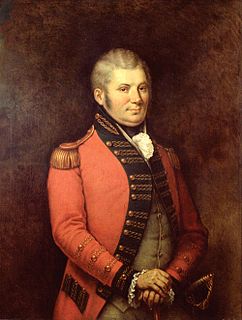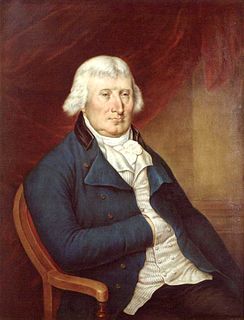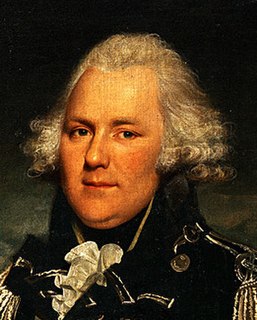Related Research Articles

John Graves Simcoe was a British Army general and the first lieutenant governor of Upper Canada from 1791 until 1796 in southern Ontario and the watersheds of Georgian Bay and Lake Superior. He founded York and was instrumental in introducing institutions such as courts of law, trial by jury, English common law, and freehold land tenure, and also in the abolition of slavery in Canada.

The Province of Upper Canada was a part of British Canada established in 1791 by the Kingdom of Great Britain, to govern the central third of the lands in British North America, formerly part of the Province of Quebec since 1763. Upper Canada included all of modern-day Southern Ontario and all those areas of Northern Ontario in the Pays d'en Haut which had formed part of New France, essentially the watersheds of the Ottawa River or Lakes Huron and Superior, excluding any lands within the watershed of Hudson Bay. The "upper" prefix in the name reflects its geographic position along the Great Lakes, mostly above the headwaters of the Saint Lawrence River, contrasted with Lower Canada to the northeast.

United Empire Loyalists is an honorific title which was first given by the 1st Lord Dorchester, the Governor of Quebec, and Governor-General of the Canadas, to American Loyalists who resettled in British North America during or after the American Revolution. At the time, the demonym Canadian or Canadien was used to refer to the indigenous First Nations groups and the descendants of New France settlers inhabiting the Province of Quebec.

Laura Secord was a Canadian heroine of the War of 1812. She is known for having walked 20 miles (32 km) out of American-occupied territory in 1813 to warn British forces of an impending American attack. Her contribution to the war was little known during her lifetime, but since her death she has been frequently honoured in Canada. Though Laura Secord had no relation to it, most Canadians associate her with the Laura Secord Chocolates company, named after her on the centennial of her walk.

The military history of Canada comprises hundreds of years of armed actions in the territory encompassing modern Canada, and interventions by the Canadian military in conflicts and peacekeeping worldwide. For thousands of years, the area that would become Canada was the site of sporadic intertribal conflicts among Aboriginal peoples. Beginning in the 17th and 18th centuries, Canada was the site of four colonial wars and two additional wars in Nova Scotia and Acadia between New France and New England; the conflicts spanned almost seventy years, as each allied with various First Nation groups.

Events from the year 1794 in Canada.

Peter Russell was a British military officer in the American War of Independence and a government official, politician and judge in Upper Canada.

Colonel the Honourable Thomas Talbot was an Irish-born Canadian soldier and colonial administrator. He founded the community of Port Talbot, Ontario, which was at one time the most prosperous town in the region due to his insistence on building quality roads, and he was responsible for enticing 50,000 people to settle in the Thames River area.

Thomas Ingersoll (1749–1812) was an early settler in Upper Canada, later Ontario. He is best known as the father of Laura Secord, who warned the British of an impending American attack on Upper Canada during the War of 1812.
Richard Beasley was a soldier, political figure, farmer and businessman in Upper Canada.

Peter Jones was an Ojibwe Methodist minister, translator, chief and author from Burlington Heights, Upper Canada. His Ojibwa name was Kahkewāquonāby, which means "[Sacred] Waving Feathers". In Mohawk, he was called Desagondensta, meaning "he stands people on their feet". In his youth his band of Mississaugas had been on the verge of destruction. As a preacher and a chieftain, as a role model and as a liaison to governments, his leadership helped his people survive contact with Europeans.
Richard Pierpoint, also known as Black Dick, Captain Dick, Captain Pierpoint, Pawpine, and Parepoint was a British soldier of Senegalese descent. Brought to America as a slave, he was granted freedom to fight on the side of the British in the American Revolution. After the war he settled in a Black community in Upper Canada, where he was given some land. He also participated in the War of 1812.

Augustus Jones was an American-born Upper Canadian farmer, land speculator, magistrate, militia captain and surveyor. Jones trained as a surveyor in New York City, and fled as a United Empire Loyalist to Upper Canada. In Upper Canada, he worked as a crown surveyor in the Nassau District, where he quickly rose to the position of Deputy Surveyor General, the highest position in a district of Upper Canada. He occupied that position from 1789 informally, and 1791 formally, until his retirement in 1799. During that time he laid down many of the township boundaries in the Niagara Peninsula and on the north shore of Lake Ontario. He led various teams that cut many of the first sideroads and concession roads into these areas, facilitating their settlement by European and American immigrants. Jones also surveyed the routes for Dundas Street and Yonge Street, and supervised their construction. After his retirement, Jones farmed first in Saltfleet Township, later moving to Brantford and finally an estate outside Paris named Cold Springs, where he died in 1836.

William Jarvis was an office holder, militia officer, and the Connecticut-born head of the Jarvis family in what is now Toronto, Ontario, Canada.
Captain Runchey's Company of Coloured Men was a Canadian militia company of free blacks and indentured black servants, raised in Upper Canada as a small Black corps under a white officer, Robert Reuben Runchey (1759–1819), a tavern keeper from Jordan, Upper Canada. The unit fought in several actions during the early part of the Anglo-American War of 1812. In 1813, Runchey's Company was converted into a unit of the Canadian Corps of Provincial Artificers, attached to the Royal Sappers and Miners, in which sappers and miners performed specialized military operations. They served on the Niagara River front during the war, and were disbanded a few months after the war ended. The Company of Coloured Men's military heritage is perpetuated in the modern Canadian Army by the Lincoln and Welland Regiment.

This is a bibliography of works on Canada. For an annotated bibliography and evaluation of major books, see also Canada: A Reader's Guide, by J.André Senécal, online.
This is a bibliography of works on the military history of Canada.
Maka Jiba was the ruler of Bundu in West Africa between around 1720 and 1764.
Captain Robert Reuben Runchey was a Canadian tavern owner who served as the first commander of Captain Runchey's Company of Coloured Men in Upper Canada during the War of 1812. Runchey was an officer in the 1st Lincoln Militia when Major-General Sir Isaac Brock appointed him commander of the all-black Company. He served from the summer of 1812 when the Company was created until the fall of that same year.
John Denison was an early settler of Upper Canada. He was a militia officer and became a member of Upper Canada's notorious family compact. Through the friendship between his family and Peter Russell and his sister Elizabeth Russell, Denison and his family became one of the province's richest.
References
- ↑ Pitt, Steve (2008). To Stand and Fight Together: Richard Pierpoint and the Coloured Corps of Upper Canada. Dundurn Press. p. 57. ISBN 978-1-55002-731-0.
- ↑ Mestern, Pat (2008). Fergus: A Scottish Town By Birthright. Dundurn Press. p. 16. ISBN 978-1770706392.
- ↑ David and Peter Meyler A Stolen Life: Searching for Richard Pierpoint, p. 73.